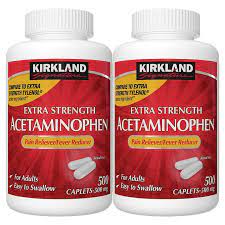acetaminophen
Acetaminophen also known as paracetamol, is a widely used over-the-counter medication used for relieving pain and reducing fever. acetaminophen is commonly recommended for the treatment of headaches, muscle aches, toothaches, menstrual cramps, and minor pain associated with colds or flu. It is not a nonsteroidal anti-inflammatory drug (NSAID) and does not possess strong anti-inflammatory properties like ibuprofen or aspirin. Instead, it primarily targets pain and fever symptoms.
How to Take this medication
It is usually taken orally and is available in various forms, including tablets, capsules, chewable tablets, liquid suspensions, and dissolvable powders. The dosage and frequency of administration depend on the age, weight, and condition of the individual. It is important to carefully read and follow the instructions on the packaging or as advised by a healthcare provider.
For adults and children above 12 years of age, the usual recommended dose is 325 mg to 1000 mg (1 to 2 tablets) every 4 to 6 hours, not exceeding 4000 mg (8 tablets) in 24 hours. For children, the dose is based on their age and weight, and it is important to use the appropriate pediatric formulation and follow the recommended dosing instructions.
Various Forms or Milligram Strengths
acetaminophen is available in different milligram strengths, ranging from 325 mg to 1000 mg per tablet or capsule. The concentration of liquid preparations may vary, and it is important to measure the appropriate dose using the provided measuring device or as directed by a healthcare provider. Different brands may offer different formulations or combinations, such as acetaminophen with cough suppressants or decongestants, so it is essential to carefully read the labels and select the appropriate product based on your needs.
What to Know Before Taking
Before taking this medication, it is important to consider certain factors and consult a healthcare provider if needed. Individuals with liver disease or a history of alcoholism should use acetaminophen with caution, as excessive use or prolonged use of high doses may increase the risk of liver damage. It is crucial to follow the recommended dosage and avoid combining acetaminophen with other medications that contain acetaminophen to prevent accidental overdose.
Patients with certain medical conditions, such as kidney disease or G6PD deficiency, should consult a healthcare provider before taking acetaminophen. It is also important to disclose any medications, including prescription drugs, over-the-counter medications, vitamins, and herbal supplements, to avoid potential drug interactions or adverse effects.
Benefits and Side Effects of acetaminophen
The primary benefits of acetaminophen include pain relief and fever reduction. It is a commonly used medication due to its effectiveness and generally low risk of side effects when used as directed. It can help alleviate mild to moderate pain, making it suitable for various conditions, including headaches, muscle aches, and toothaches. It also helps to reduce fever, which is often associated with infections or inflammatory conditions.
However, acetaminophen can cause side effects, especially if used in excessive doses or for an extended period. Common side effects may include nausea, stomach upset, and allergic reactions such as skin rash or itching. In rare cases, acetaminophen overdose can lead to liver damage, which can be life-threatening. It is crucial to adhere to the recommended dosage and seek medical attention if you experience severe or persistent side effects.
How This Medication Works
The exact mechanism of action of acetaminophen is not fully understood. It is believed to work by inhibiting certain enzymes in the brain called cyclooxygenases (COX), which are involved in the production of chemicals called prostaglandins. By reducing the levels of prostaglandins, acetaminophen helps to decrease pain and fever. Unlike NSAIDs, acetaminophen has minimal effect on inflammation, which makes it a suitable option for individuals who cannot tolerate or should not take NSAIDs.
What to Avoid When Taking This Medication
When taking this medication, it is important to be aware of certain precautions and avoid potential complications. Here are some key points to consider:
Avoid exceeding the recommended maximum daily dose of acetaminophen (4000 mg for adults). Taking more than the recommended dose can increase the risk of liver damage.
In conclusion, acetaminophen is a widely used medication for pain relief and fever reduction. It is available in various forms and milligram strengths, and the appropriate dosage depends on age, weight, and individual needs. Acetaminophen offers benefits in managing mild to moderate pain and reducing fever.
Where to buy this Medication :
At weightlosspharm.com , we provide only FDA approved medications for weight, steroids and other prescription medications and we are capable of delivering this product to your door posts or desired delivery address without any complications or problems.



Reviews
There are no reviews yet.